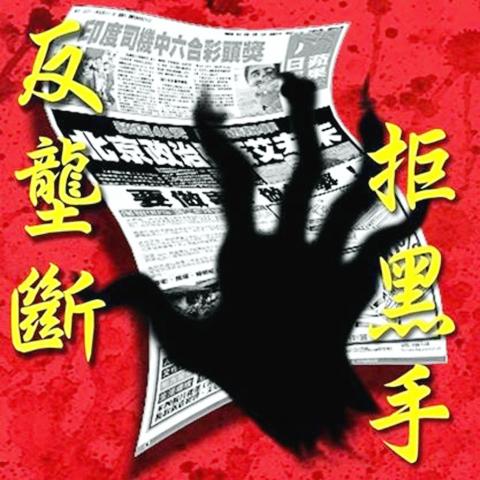Nearly 60 percent of Taiwanese support a full government ban on 4G telecommunication service operators using base stations made by Chinese manufacturers over concerns about national security, a survey by the Digital Convergence Development Association showed yesterday.
The survey also found that about 70 percent of respondents are concerned about national security risks from 4G operators using Chinese telecom facilities, and 69 percent are worried that Beijing could obtain information on Taiwan’s telecom infrastructure through Taiwanese businesspeople in China, or other methods.
Overall, the survey showed that about 58 percent of those polled have no confidence in the government’s ability to fend off cyberattacks from China or other countries.

Image taken from the Youth Alliance Against Media Monsters’ Facebook page
The figure was 7.1 percentage points higher than that recorded in the survey that the association conducted in December last year.
The public’s attitude toward local telecom operators using China-made 4G facilities was about the same as the last survey, with the difference being less than 2 percentage points.
The issue of whether telecom carriers should be allowed to use telecom facilities made in China came to the public’s attention earlier this year after Hon Hai Group (鴻海集團) chairman Terry Gou (郭台銘) threatened to withdraw the group’s investment in Taiwan, stop paying taxes and move overseas if the Taiwanese government failed to provide a reasonable explanation why he could not use base stations produced by Chinese company Huawei Technologies (華為).
The survey was also designed to identify if there had been any shift in attitude toward cable television, telecom services and the media in general.
Among the poll’s significant findings, about 74 percent of respondents said that public opinion in Taiwan was monopolized by certain media groups, up 13.3 points from the previous survey.
While 45 percent said they oppose any form of government funding in television, 44.5 percent said they support government funding to raise programming quality.
Commenting on the findings, Weber Lai (賴祥蔚), a professor at National Taiwan University of the Arts’ radio and television department, said he was horrified at the dramatic increase in the way people perceive the monopolization of public opinion in Taiwan.
The result “is a bit different from what I have observed,” Lai said.
“I suggest that the survey next time ask respondents who they think is monopolizing public opinion. It may be that they mean an oligopoly, not a monopoly,” Lai said.
Christy Chiang (江雅綺), an assistant professor at National Taipei University of Technology, said that the survey showed that more people support restricted government funding to improve the quality of programming, which is very different from 10 years ago.
While 4G operators are seeking more freedom in choosing whatever facilities they see fit, they are simultaneously restricted by public concern for information security, she said.
“Instead of worrying that the government will monopolize public opinion, they now care more that the same thing could be done through any private group,” she said.

Seventy percent of middle and elementary schools now conduct English classes entirely in English, the Ministry of Education said, as it encourages schools nationwide to adopt this practice Minister of Education (MOE) Cheng Ying-yao (鄭英耀) is scheduled to present a report on the government’s bilingual education policy to the Legislative Yuan’s Education and Culture Committee today. The report would outline strategies aimed at expanding access to education, reducing regional disparities and improving talent cultivation. Implementation of bilingual education policies has varied across local governments, occasionally drawing public criticism. For example, some schools have required teachers of non-English subjects to pass English proficiency

‘FORM OF PROTEST’: The German Institute Taipei said it was ‘shocked’ to see Nazi symbolism used in connection with political aims as it condemned the incident Sung Chien-liang (宋建樑), who led efforts to recall Democratic Progressive Party (DPP) Legislator Lee Kun-cheng (李坤城), was released on bail of NT$80,000 yesterday amid an outcry over a Nazi armband he wore to questioning the night before. Sung arrived at the New Taipei City District Prosecutors’ Office for questioning in a recall petition forgery case on Tuesday night wearing a red armband bearing a swastika, carrying a copy of Adolf Hitler’s Mein Kampf and giving a Nazi salute. Sung left the building at 1:15am without the armband and apparently covering the book with a coat. This is a serious international scandal and Chinese

TRADE: The premier pledged safeguards on ‘Made in Taiwan’ labeling, anti-dumping measures and stricter export controls to strengthen its position in trade talks Products labeled “made in Taiwan” must be genuinely made in Taiwan, Premier Cho Jung-tai (卓榮泰) said yesterday, vowing to enforce strict safeguards against “origin laundering” and initiate anti-dumping investigations to prevent China dumping its products in Taiwan. Cho made the remarks in a discussion session with representatives from industries in Kaohsiung. In response to the US government’s recent announcement of “reciprocal” tariffs on its trading partners, President William Lai (賴清德) and Cho last week began a series of consultations with industry leaders nationwide to gather feedback and address concerns. Taiwanese and US officials held a videoconference on Friday evening to discuss the

PERSONAL DATA: The implicated KMT members allegedly compiled their petitions by copying names from party lists without the consent of the people concerned Judicial authorities searched six locations yesterday and questioned six people, including one elderly Chinese Nationalist Party (KMT) member and five KMT Youth League associates, about alleged signature forgery and fraud relating to their recall efforts against two Democratic Progressive Party (DPP) legislators. After launching a probe into alleged signature forgery and related fraud in the KMT’s recall effort, prosecutors received a number of complaints, including about one petition that had 1,748 signatures of voters whose family members said they had already passed away, and also voters who said they did not approve the use of their name, Taipei Deputy Chief Prosecutor